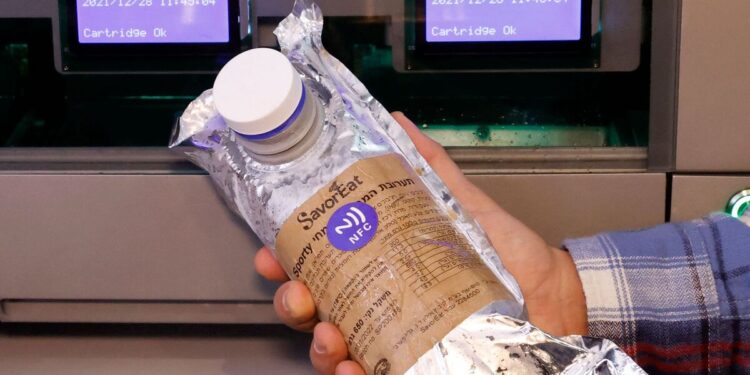The Israeli food industry continues to expand. Israel currently ranks second in the world by number of farmed meat companies after the United States and third by number of investors in the field of alternative proteins.
A recent report from Israel Institute of good food showed that investments in Israeli food technology startups reached $ 320 million in the first six months of 2022, a 160% jump compared to the same period in 2021. On a global scale, investments in the sector between January and June 2022 they reached $ 1.75 billion, with Israeli companies attracting about 18% of investments worldwide.
The report indicated that during the first half of 2022, Israeli food companies attracted $ 161 million in investments, 22% of total global investments in this field. Israeli fermentation protein companies attracted $ 152 million, 38% of the world’s global investments and second only to the United States.
Plant-based steak developer Redefine Meat tops Israeli food technology investments with $ 135 million, followed by fermentation dairy producer Remilk with $ 130 million.
Mermade Foods, based in Jerusalem, is the first company in the world to grow scallops in the laboratory. CEO Daniel Einhorn told Al-Monitor that the company raised $ 3.3 million in a “tough time” for the global market. He originally explained it Mermade Foods, launched in 2021, aimed at an investment of $ 2.5 million, but the over-underwriting of around 30% shows investor confidence in the unique technology developed by this startup.
Einhorn explained that growing food in the lab is an expensive process due to the high prices of the fresh ingredients that are fed to the cells. Mermade Foods, which plans to start commercial production in three years, has developed a method to recycle cell waste using microalgae and then reuse it to feed cells. This patent-protected method is intended to significantly reduce manufacturing costs.
On choosing to focus on scallops, Einhorn said there is a huge $ 8 billion market potential for this product globally.
He added that his startup aims to “save the world from climate catastrophe” by arguing that the fishing industry and aquaculture are more harmful to our planet than the meat industry. Einhorn pointed out that the company’s product will be “cleaner” and healthier than “normal” seafood as it will not include chemicals, antibiotics, microplastics or mercury.
Several established Israeli companies and funds are also involved in the growing food technology industry. The most important is the Tnuva Group, Israel’s largest food producer and leading producer of dairy products. Earlier this year, Tnuva announced the establishment of a new investment fund called Tnuva NEXT to invest in food-tech startups.
Tnuva is also a partner of the Fresh Start Food-tech incubator located in Kiryat Shmona, near the border with Lebanon. Opened in 2020, Fresh Start took part in the incubation program set up by the Israeli Innovation Authority. In two years it has completed investments in 10 food-tech start-ups, including ProFuse, which operates in the field of cultured meat, and BlueTree, which has developed a technology to lower the sugar content of fruit juices.
Speaking with Al-Monitor, Tnuva’s Chief Innovation Officer Shai Cohen revealed that since its inception 18 months ago, Tnuva Ventures, the group’s corporate venture capital fund, has completed investments worth $ 10 million. Tnuva, Cohen said, invests in several aspects of the industry, including research, development and manufacturing. You have described Israel as a world power in food technology, especially in the domain of alternative proteins.
Cohen explained that one of the reasons for Israel’s success is its high-tech ecosystem, which includes a strong biotech industry, a strong agrochemical industry, and a major medical industry.
This leadership is evident in the numbers. Cohen revealed that there are currently around 340 Israeli food technology companies and an average of 42 companies are founded each year. Tnuva predicts that within a decade, 15% of the global meat and chicken market will be based on alternative proteins and that by 2030 the world market for alternative proteins will reach a value of $ 300 billion. Another important trend that Tnuva foresees is the interest in products with a hybrid content of vegetable proteins and proteins produced through fermentation.
Israeli food technology entrepreneurs stress the importance of the industry in addressing food insecurity, especially in the Middle East and North Africa, which is predominantly desert and has experienced rapid population growth.
Naftaly Moser is a regional business consultant in high-tech development with 20 years of experience. He believes that the Israeli food industry can consolidate cooperation between Israel and its Arab neighbors.
Speaking with Al-Monitor, Moser noted that parts of the MENA region are already facing food shortages. No wonder, he said, that the Negev Forum, established earlier this year with the participation of four Arab countries – Morocco, Egypt, Bahrain and the United Arab Emirates – along with Israel and the United States, has decided to form a committee on food insecurity.
“The Arab countries are obviously aware of Israel’s experience in this field. Completely resolving global insecurity may not be achievable, but easing food insecurity in our region could certainly only be achieved through cooperation,” he said. affirmed.






















